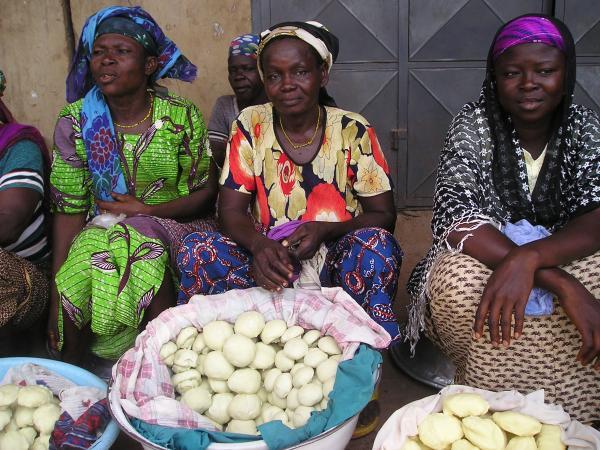
Support for micro-businesses creates positive social and economic impacts
In order to address the limited availability of financial services to the poor and economically marginalised, the Bank supports an increasing number of microfinance investment vehicles that invest in and provide technical assistance to local microfinance institutions.
Alongside the provision of debt and equity to selected microfinance institutions (MFIs), the EIB has more recently made TA funds available to these institutions to enable them to extend sustainable microfinance services and develop innovative products that, in turn, will generate positive social and economic impacts for small and micro-businesses.
Since 2007, more than EUR 15m has been made available from the TA envelope of the ACP-EU Cotonou Partnership Agreement for capacity-building measures in MFIs. Many MFIs have significant needs for capacity-building, and transfer of knowledge in order to succeed as self-sustaining institutions. The ultimate objective of these efforts is to enable local staff to manage microfinance institutions in a sustainable way in order to become self-sufficient and independent from external aid. Below, you can take a glimpse at some capacity-building efforts in the microfinance sector.
Dominican Republic- Building capacities in the financial sector
For the past 12 years, the Bank has supported the development and growth of the microfinance sector in the Dominican Republic, playing an instrumental role in the development of Banco de Ahorro y Crédito Ademi (ADEMI) and Banco Adopem. With this objective in mind the EIB extended its support to other initiatives addressing the specific development needs of a wider spectrum of microfinance institutions in the country, from the smallest to the largest and regulated ones. Local entrepreneurs - notably in rural and poor areas - will benefit from improved long-term financing opportunities. Under this cooperation, a comprehensive TA programme is being provided by a specialised consultant. The TA operation comprises five elements: Operational Risk Manual Application; Demand Study; Credit Technology Improvement; Corporative Governance Improvement; and Agricultural Products.
Within the Operational Risk Management component for example, various materials and documents, such as manuals are elaborated. A number of training sessions and workshops are conducted to train up the relevant unit, the main heads of departments and related employees to allow them to recognise, analyse, reduce and handle operational risk. One principal objective of these training sessions is to enable the participating key personnel to train other staff (‘train the trainer') and thereby to enhance the outreach to all levels of the institution.
AccesBankLiberia - Improving access to financial services for SMEs and micro-enterprises
Teaming up with Access Microfinance Holding of Germany as well as the International Finance Corporation and the African Development Bank, the EIB has established AccessBank Liberia (ABL) as the country's first commercial bank specialising in micro and small business finance. After many years of devastating civil war, Liberia's economy has only very recently started to recover. Micro and small enterprises play a pivotal role in this process but have so far lacked any access to credit. Since opening its doors in 2009, ABL has extended more than 3 700 loans averaging some USD 1 100 to micro entrepreneurs. The outstanding portfolio amounts to some USD 2.5m and shows an excellent quality - as of January 2010 only one of the outstanding 2 886 loans was in arrears by more than 30 days. Operating from three branches across Monrovia, ABL has already trained more than 160 local staff and has quickly established itself as the bank of choice for Liberia's small entrepreneurs. This is underscored by the 14 000 savers who have opened accounts with ABL.
AccèssBanque Madagascar
In January 2008, the EIB signed a TA agreement with LFS, the manager of Access Microfinance Holding and a designated TA provider, to support the creation of four greenfield microfinance institutions (MFIs), one of which was located in Madagascar.
Within two years of operation, AccèsBanque Madagascar (ABM) has opened six branches in Antananarivo, the capital of Madagascar. "Given the rapid growth in clients we have experienced, we are now planning to extend our operations outside the capital," says Mamonjisoaniaina Albertine Hantanirina, Head of the Micro Credit Department at AccèssBanque. "When I joined ABM in 2006 as a loan officer, I did not have a lot of experience, but we went through a two-year period full of learning and training. With advice and support from our supervisors, we were able to develop professionally and, little by little, acquired self-confidence and were able to build good relationships with our clients. While before I was only involved in lending, I had the opportunity to deepen my knowledge in many fields, such as banking operations, administration, marketing and human resources. I was very proud of myself and my interest in the job grew, taking a larger place in my life and especially in my heart. In 2008, I was appointed head of the Micro Credit Portfolio. It is really a huge happiness for me and I feel a big enthusiasm. But I would not have achieved all this without the kind consideration and support from my supervisors and the precious advice from my colleagues and the consultants from LFS."